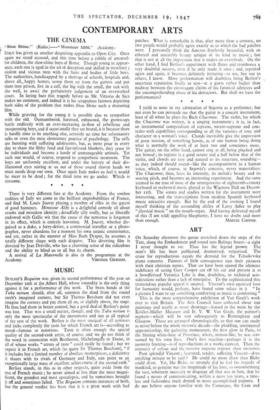CONTEMPORARY ARTS
THE CINEMA
" Shoe Shine." (Rialto.)--" Monsieur (Academy.)
ITALY has given us another despairing appendix to Open City. Once again we stand accused, and this time before a rabble of uncared- for children, the shoe-shine boys of Rome. Though young in appear- ance, each one is aged in the art of deception and skilled in treachery ; violent and vicious men with the faces and bodies of little boys. The authorities, handicapped by a shortage of schools, hospitals and, above all,, happy homes, scoop them up from the gutters and put them into prison, five in a cell, the big with the small, the sick with the well, to await the perfunctory judgement of an overworked court. In laying bare this tragedy before us Mr. Vittorio de Sica makes no comment, and indeed it is his scrupulous fairness depicting both sides of the problem that makes Shoe Shine such a shattering film.
While grieving for the young it is possible also to sympathise with the old. Outnumbered, harassed, exhausted, the grown-ups battle endlessly with an ever-increasing in-flow of rebellious and exasperating boys, and if occasionally they are brutal, it is because there is hardly time to be anything else, certainly no time for reformatory talks or even the most elementary practice of psychology. The cells are bursting with suffering adolescents, but, as more pour in every day to share the filthy food and lice-infested blankets, they cease to be individuals and become a horde of unmanageable animals. Yet each one would, of course, respond to sympathetic treatment. The boys are uniformly excellent, and under the battery of their dis- illusioned eyes staring at us out of those round shaven heads we must needs drop our own. Once again Italy makes us feel it would be nicer to be dead ; for the third time we go under. Which is tiresome.
There is very different fare at the Academy. From the sombre realities of Italy we come to the brilliant improbabilities of France, and find M. Louis Jouvet playing a number of roles in the gayest of good humours. Monsieur Alibi is a delightful comedy all about crooks and mistaken identity ; dreadfully silly really, but so liberally endowed with Gallic wit that the cause of the nonsense is forgotten in its effect, which is entirely leavening. M. Jouvet, whether dis- guised as a duke, a lorry-driver, a commercial traveller or a photo- grapher, never abandons for a moment his own satanic countenance, and yet, rather in the manner of Miss Ruth Draper, he assumes a totally different shape with each disguise. This diverting film is directed by Jean Dreville, who has a charming sense of the ridiculous and the ability to blind us to all but its charm.
A revival of La Maternelle is also in the programme at the


































 Previous page
Previous page